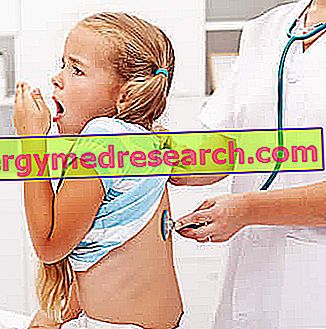Generality
Cough in children is a fairly common disorder, which can be a symptom of different types of diseases.

Cough in children - as well as that which occurs in adult patients - can be of two types:
- Fat cough, accompanied by the emission of mucus or phlegm (sputum);
- Dry or non-productive cough, or a cough devoid of any type of sputum.
In some cases, moreover, the cough can also be mixed, ie the child alternates phases of the day coughs up with phases of dry cough.
Causes
The causes of coughing in children can be multiple and linked to various factors, such as pathologies of the airways of various origins and nature and environmental factors.
Among the most common causes of cough in children, we recall:
- Colds;
- Influence;
- Inflammations of the airways (bronchitis, pharyngitis, tracheitis, etc.);
- Respiratory tract infections, both bacterial (such as, for example, pertussis, tuberculosis or bronchopneumonia) and viral infections (influenza and parainfluenza viruses, rhinoviruses and measles viruses);
- Allergies;
- Asthma;
- Respiratory tract tumors;
- Taking certain types of drugs;
- Presence of foreign bodies in the airways;
- Inhalation of irritants.
Depending on the cause, the cough can be acute (lasting less than three weeks), or chronic (lasting more than three weeks). However, the most common type of cough in children is the acute one.
Symptoms
As stated, cough is itself a symptom of an underlying pathological condition.
However, this symptom may in turn favor the appearance of some disorders, such as throat irritations, vomiting, insomnia, agitation and chest pain due to the continuous coughing.
Furthermore, the symptoms of the disease that caused it are often associated with coughing. For example, if the cough in children is caused by colds or flu, it can be accompanied by:
- Temperature;
- Headache;
- Sore throat;
- Nausea;
- Diarrhea;
- Hoarseness;
- Articolar pains;
- Loss of appetite;
- Diarrhea.
A particular type of cough in very young children is the so-called croup (or barking cough, due to the similarity of the cough with the barks emitted by the dog).
Diagnosis and Therapy
In the case of coughing in children, it is very important that the doctor diagnoses the cause of this symptom promptly, so that a suitable therapy can be established.
For example, if the cough is caused by bacterial infections, the pediatrician will prescribe antibiotic drugs, such as amoxicillin (Zimox®, Augmentin®) or cefixime (Cefixoral®). If the cause was inflammatory, however, the doctor may opt for the administration of anti-inflammatory drugs, such as ibuprofen (Antalfebal®).
In addition to this, if the doctor deems it appropriate, he can also decide to start a pharmacological treatment aimed exclusively at contrasting the symptom cough.
In truth, the pharmacological treatment of cough in children is a rather controversial issue, since there are no clinical studies carried out on pediatric patients able to confirm the real efficacy and effective safety of the use of antitussive drugs in this category of patients.
In any case, basically two types of drugs can be used for the treatment of cough in children:
- Cough sedatives - such as dextromethorphan (Bisolvon®, Lisomucil Tosse®, Bronchenolo Tosse®) and levodropropizine (Levotuss®) - whose use is carried out in case of dry cough;
- Fluidifying agents or mucolytics - such as N-acetylcysteine (Fluimucil®) or ambroxol (Fluibron®) - whose task is to fluidify, therefore to favor the expulsion, of the secretions that characterize the fat cough.
In any case, the decision whether or not to administer medicines for the treatment of cough in children, as well as the choice of the active ingredient, the dose of drug to be taken and the duration of the therapy belong exclusively to the pediatrician who is treating the child .
Therefore, it is essential not to do one's own thing and to avoid giving the child (especially if very small) any type of drug - even those without a medical prescription - without first having asked for the doctor's advice. In fact, the improper administration of cough medicines could sometimes be counterproductive, if not even harmful or potentially dangerous for the child.
When to worry?
As mentioned, cough in children can be the symptom of both mild pathologies (such as flu and cold), and serious pathologies (such as bronchopneumonia, or worse, tumors).
However, in most cases, cough is a symptom that easily disappears once the cause has been identified and treated.
Notwithstanding that it is always good to ask for a pediatrician's consultation, it is of fundamental importance especially in the following cases:
- When it is not clear why the cough arose;
- When the cough has lasted for more than three weeks;
- When coughing is associated with respiratory distress and / or increased respiratory rate, as these could be symptoms of a possible underlying asthmatic disease;
- When the cough is accompanied by cyanosis (bluish color of the skin) or pallor; warning of respiratory distress, these symptoms should prompt parents to contact the pediatrician immediately or - if particularly accentuated - to contact the nearest hospital immediately;
- When the cough is accompanied by a high fever, since it could be an indication of the presence of infections;
- When it is suspected that the child may have inhaled some foreign body.



